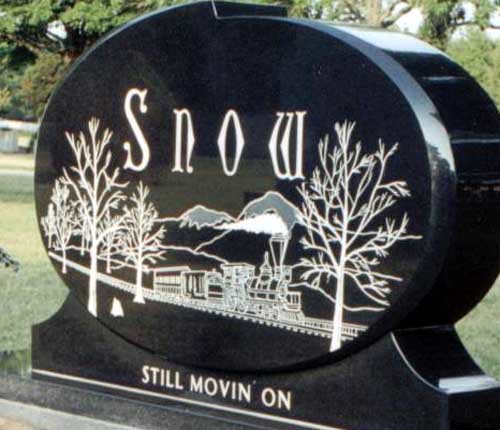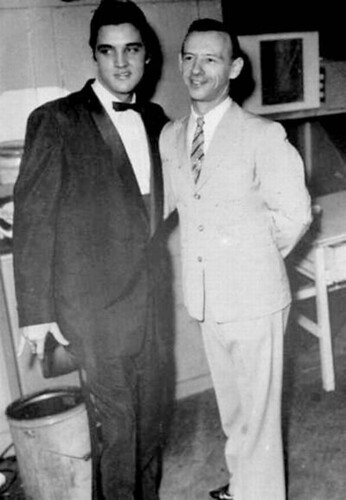 Hank Snow, another of the Nudie Suit-wearing, honky tonkin' stars of early post-war country music is, for Peter Guralnick, a pair with Ernest Tubb. Both were profoundly shaped by their early exposure to Jimmie Rodgers, and worked to maintain his legacy (most notably at the Jimmie Rodgers Country Music Festival, annually in his hometown of Meridian, Mississippi). Both served long apprenticeships prior to "making it" in mainstream country, including unsuccessful stints in Hollywood trying to fit the Gene Autry mold. Both encapsulated the "Golden age" country sound, a sound that was the face of American popular music for an enormous share of the nation between 1940 and 1956, and both (but especially Hank) helped to sponsor and usher in the music that would eventually surpass their own in popularity in Tennessee and far, far beyond.
Hank Snow, another of the Nudie Suit-wearing, honky tonkin' stars of early post-war country music is, for Peter Guralnick, a pair with Ernest Tubb. Both were profoundly shaped by their early exposure to Jimmie Rodgers, and worked to maintain his legacy (most notably at the Jimmie Rodgers Country Music Festival, annually in his hometown of Meridian, Mississippi). Both served long apprenticeships prior to "making it" in mainstream country, including unsuccessful stints in Hollywood trying to fit the Gene Autry mold. Both encapsulated the "Golden age" country sound, a sound that was the face of American popular music for an enormous share of the nation between 1940 and 1956, and both (but especially Hank) helped to sponsor and usher in the music that would eventually surpass their own in popularity in Tennessee and far, far beyond.Hank Snow's story is nonetheless a unique one--the first Canadian to become a star in a most American style of music. His youth in Nova Scotia, to parents whose economic lives weren't all that dissimilar to the lives of most poor whites in the American South. His abusive step-father and hard economic times sent him to sea as a cabin boy in his early teens, but that couldn't stop him form having that same epiphany young Ernest Tubb did, when at age 16, he heard Jimmie Rodgers for the first time. But years of struggles, as a DJ and singer on Canadian radio, barnstorming, and finally (with the better-established Tubb's help), a gig at the Grand Ole Opry, one that turned into a 40+ year permanent gig.
Hank Snow on Jimmie Rodgers' influence on his own songwriting
Ultimately, aside from his own iconic status, he's here for two reasons--his role in helping to get a 19 year old Elvis the Opry gig that helped to launch his career, and as proof of the both the influence of his kind of country music had on such a large cross section of the U.S., and his continued support of the country mainstream in the face of its erosion in the 70s. Like Tubb, he continued to appear regularly on the Opry well after the biggest stars no longer appeared regularly. And his singles, like Tubb's were, as Guralnick puts it on page 46, the music "that marked a whole generation's passing into musical maturity." Guralanick's project with Snow reminds me of my own efforts to convince myself of how good the Rolling Stones really were as a teenager. When I bought Hot Rocks, I was unconvinced--"Satisfaction" and all the rest were on my Dad's oldies channel, and they sounded played-out to me. I couldn't hear them with open ears. It took Exile on Main Street, packed full of songs I'd never heard out of tinny clock radio speakers, to convince me how good they really were. Hank Snow's influence is, as Guralnick argues, hard for a post-Elvis generation to appreciate, but it is, as I noted with Tubb, what my grandparents would have recognized as archetypal country music (He also had a keen ear for the novelty song, as tracks like the "Rhumba Boogie" bear out). For those looking for direct lines of influence, check out part 13 of an ongoing series of posts over at another Whoopee in Hell favorite, "Any Major Dude With Half a Heart" (yes, that's a Steely Dan reference, but don't be frightened off, good people, it's an excellent blog) looking at original versions of famous songs. Your curiosity will be rewarded with a Hank Snow song that became a big (US #2) hit for Elvis in 1959.
As with Tubb, in this chapter Guralnick's interest is with Snow's first big recordings, rather than on the 1950s singles like "I've Been Everywhere," "Miller's Cave," and "The Golden Rocket" that are the "Singing Ranger's" (because, of course, he's Canadian) best legacy. He's a man few people alive remember as a young performer--he lingered on for such a long time that he's remembered more for his golden years on the Opry (the reference to him in Smokey and the Bandit, e.g.) than for his early hit-making. But here's those early hits, nonetheless.
Hank Snow (as Hank, the Yodeling Ranger) - Lonesome Blue Yodel
Hank Snow (as Hank, the Yodeling Ranger) - Prisoned Cowboy
Hank Snow - Brand on my Heart
Hank Snow - Marriage Vow
Hank Snow - (I'm) Movin' On (#1 Hit, 1950)
Hank Snow - That's When He Dropped the Whole World in My Hands
Hank Snow - I Don't Hurt Any More (#1 hit, 1954)
Also Mentioned:
David Houston (in a negative light)- Almost Persuaded
And for good measure:
Hank Snow - Rhumba Boogie
Posted by Brandon






No comments:
Post a Comment